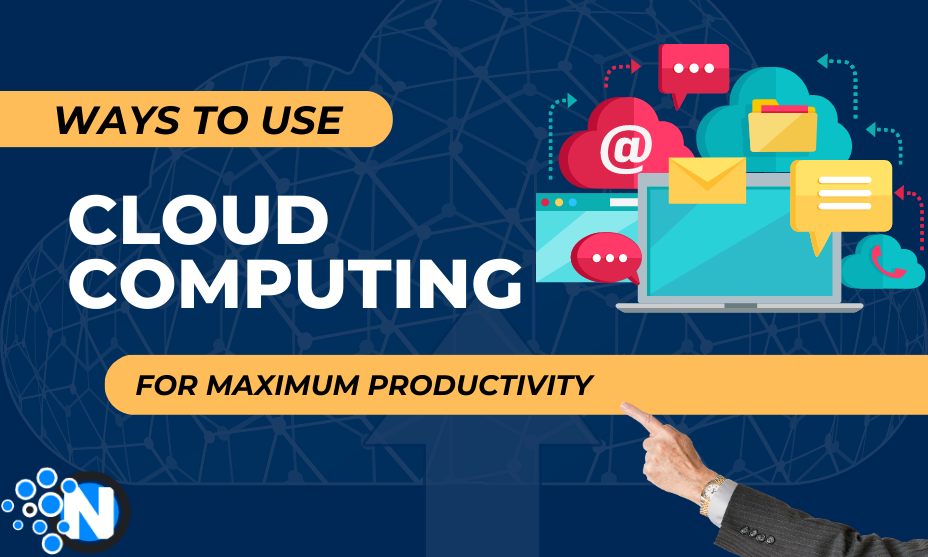Ways to Use Cloud Computing for Maximum Productivity

Cloud computing is a high tech that accesses data through the internet by using the internet for storing and managing data on remote servers. In recent years, cloud computing has recognized the ways of directing businesses. Without having to make costly hardware or software investments, it has made it simpler for businesses to access various computing resources, including storage, processing power, and apps.
Cloud computing has developed into a useful tool for increasing office efficiency. We’ll look at ways cloud computing might be used in the business for maximum efficiency. Cloud computing customers rent the usage from third-party providers because they lack physical infrastructure.
What is Cloud Computing?
Cloud computing delivers computing services, including servers, storage, databases, networking, software, and analytics over the internet or the “cloud.” Cloud computing providers like Amazon Web Services (AWS), Microsoft Azure, and Google Cloud Platform allow users to access these resources on-demand rather than purchasing and maintaining them on-premises.
Below given points are some of the ways through which cloud computing can help you.
Enhanced Productivity
Cloud computing can be helpful in businesses with the tools and recourses they need to work more efficiently. Cloud-based applications such as Microsoft Office 365, Salesforce, and Dropbox give workers access to the most modern tools and technologies, permitting them to job more efficiently and collaboratively. The program is very effective for those who choose the right provider. Email, messaging, and video conferencing are cloud services that can help the workforce to communicate more effectively and efficiently.
Automation
Cloud computing is very helpful in automating many IT processes, which can save time and improve the efficiency of businesses. Automation tools such as AWS Lambda, Azure Functions, and Google Cloud Functions allow businesses to robotize operations such as backup and recovery, scaling, and monitoring. This can provide companies to focus on their core competencies and lessen the time and attempts needed to manage IT infrastructure.
Data Analysis
To analyze a vast amount of information of companies smoothly and swiftly, cloud services help to be most beneficial. Cloud-based analytics tools such as AWS Athena, Google BigQuery, and Azure Synapse Analytics let businesses inspect huge volumes of data and gain insights swiftly. This can aid companies make more enlightened commitments and boost their general performance.
The Resilience
One of its main benefits is the resilience or flexibility of cloud computing. Businesses can respond to shifting business demands, for computing resources may be scaled up or down as needed. For example, businesses can quickly increase their computing capacity to handle the increased workload during busy business seasons. It also provides an opportunity to access data from anywhere, proving to be more productive.
Better Security

Cloud service providers usually offer strong security measures to protect data and applications from cyber threats. Cloud service providers typically use advanced encryption technologies, multi-factor authentication, and intrusion detection and prevention systems to protect data and applications. In addition, cloud service providers typically employ teams of security experts who monitor their systems 24/7 to detect and respond to potential security threats.
Disaster Betterment
To protect their data and applications, cloud computing is helpful for businesses in the event of a disaster. Cloud providers typically offer multiple data centers in different geographic locations, through which you can use replication of data and applications across multiple sites for redundancy. The process recovers quickly from businesses from disasters such as natural disasters, cyber-attacks, or hardware failures.
Cost Stake Funds
Reducing cost is one of the most beneficial ways of distributed computing. Businesses can keep away from the ahead-of-time capital costs of acquiring hardware, software, and infrastructure via cloud computing, over and above the ongoing fetch of organizing their IT systems. Ideally, businesses can remarkably spend less money by funding for what they make use of through benefaction or pay-per-use models.
Enhanced Teamwork
Through Cloud computing, collaboration is possible for employees. From any location in the world, teamwork makes it easy on documents projects and tasks in exact time. Teams can coherently collaborate and allocate files and data in a secure and accessible manner.
Cloud-based applications like Slack, Google Drive, and Microsoft Teams gain all the credit. This creates a more innovative work environment, streamlines workflows, and brushes up communication.
Extensible Cloud Computing
The ability to increase or decrease the amount of computing recourses can be given by cloud computing, which they use as needed. The cloud provides a cost-effective and secure means of storing and managing large volumes of data. You can access this data from anywhere.
Cloud-based platforms provide businesses a flexible and scalable infrastructure to run their applications and workloads while minimizing costs. This suggests that organizations can quickly add more strong points to cope with popular spikes or diminish assets during slow intervals.
This can help businesses save money by only paying for the means. They called for and avoided over-provisioning their IT infrastructure. The extensibility is noticed as a systemic measure to expand a system and the level of system required.
Remote Control
Employees can easily obtain applications and data from anywhere in the world if they have an internet connection and the skill to scale the data up or down as needed rapidly. This is, for the most part, advantageous for farfetched workers or employees who travel intermittently.
Workforce can operate work from anywhere and even at any time for cloud-based applications and services can be accessed from any device, including smartphones, laptops, and tablets. It is important to use appropriate security measures while using remote control in cloud computing.
Conclusion
To sum up, cloud computing offers numerous ways to increase productivity across diverse businesses and domains. Businesses that use cloud computing services can get an advantage from greater productivity, cost savings, and scalability, among other advantages.
Using cloud computing for productivity enhancement can be done in several ways, including Cloud-based collaboration tools that enable teams to work together on projects from anywhere in the world in real-time.
Cloud-based platforms can accelerate application development and deployment while minimizing the need for in-house infrastructure and resources. Businesses can streamline operations, reduce costs, and improve overall productivity, ultimately leading to greater success and growth.




